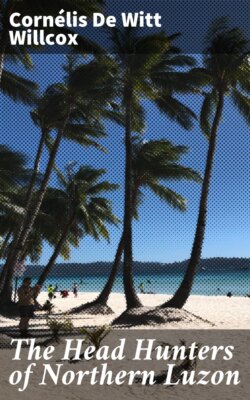Читать книгу The Head Hunters of Northern Luzon - Cornelis De Witt Willcox - Страница 11
На сайте Литреса книга снята с продажи.
Chapter VII.
ОглавлениеTable of Contents
School at Campote.—Our white pony, and the offer made for his tail.
It was too dark by this time to see or do much. We had supper, looked up the place where we were to sleep, and then collected at the lower of the two shacks. Here we received visits, so to say, from as many Ilongots, grown men only, as could get into the place. In truth, we were as much objects of curiosity to them as they possibly could have been to us. To Mr. Worcester the occasion was one of business, explaining through interpreters why we had come, what the Government wanted, getting acquainted with the cabecillas (head men), and listening to what they had themselves to say. One of our visitors was a grandfather, remarkable, first, because of his heavy long beard, and, second, because his own grandfather was alive; five generations of one family in existence at the same time.
Campote, I may as well say it here as anywhere else, is merely a point where Connor has established a school for children, under a Christianized Filipino teacher. Some thirty children in all are under instruction, the average attendance being twenty-four. It is almost impossible, so Connor told us, to make these people understand why children should go to school, or what a school is, or is for, anyway. However, a beginning has been made. They all have a dose of “the three Rs”; the boys are taught, besides, carpentry, gardening, and rope-making, and the girls sewing, weaving, and thread-making from cotton grown by the boys on the spot. They ought to show some skill in all these arts; for the native rice-basket is a handsome, strong affair, square of cross-section, with sides flaring out, and about three feet high, and some of their weapons show great manual skill. The garden was on show the next morning, displaying beans, tomatoes, cotton, perhaps other things that I failed to recognize or have forgotten, anyway, a sufficient garden. There is besides an exchange here for the sale of native wares.
One of our party had ridden a white pony, and was much amused, as were all of us, to receive an offer for his tail! There is nothing else the Ilongots hold in higher estimation than white horse-hair, and here was a pony with a tail full of it! But the offer was refused; the idea of cutting off the tail was not to be entertained for one moment. Certainly, he might keep its tail: what they wanted was the hair. Would he sell the hair? No; that was only a little less bad than to sell the tail itself.
On our way back to the shack in which some of us were to sleep (the school-house it was) we noticed an admiring crowd standing around the pony, tethered under the house, and all unconscious of the admiration he was exciting, most rudely presenting his hind-quarters to his admirers. But that was not his intention; the crowd—half women, by the way—wanted to be as close to the tail as possible. We left them gesticulating and pointing and commenting, much as our own women might while looking at crown jewels, but not so hopelessly; for the next morning, when we next saw the pony, nearly all the hair had been pulled out of his tail, except a few patches or tufts here or there, tougher than the rest, and serving now merely to show what the original dimensions must have been.
While we were undressing in came a little maiden, who marched up to every one of us, shook hands, and said, “Good evening, sir.” We were pretty well undressed, but our lack of clothes looked perfectly natural to her, perhaps inspired her with confidence. She said her name was Banda, that she was thirteen, but of this she could not know, as all these children had had ages assigned to them when they entered the school; after greeting us all, and airing her slight stock of English, she withdrew as properly as she had entered. A trifling incident, perhaps not worth recording, but in reality significant, for it marked confidence, especially as she had come in of her own accord. We all agreed that she was very pretty.
